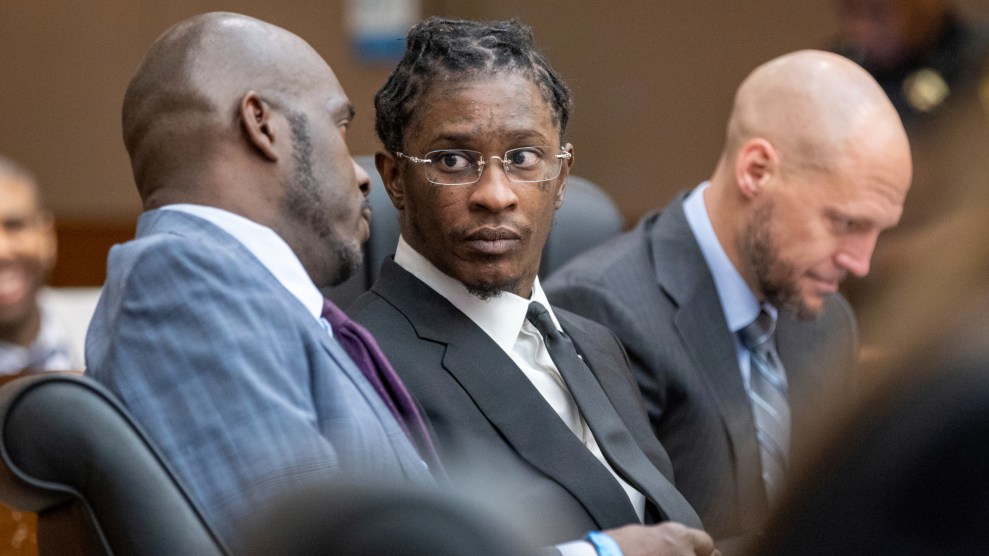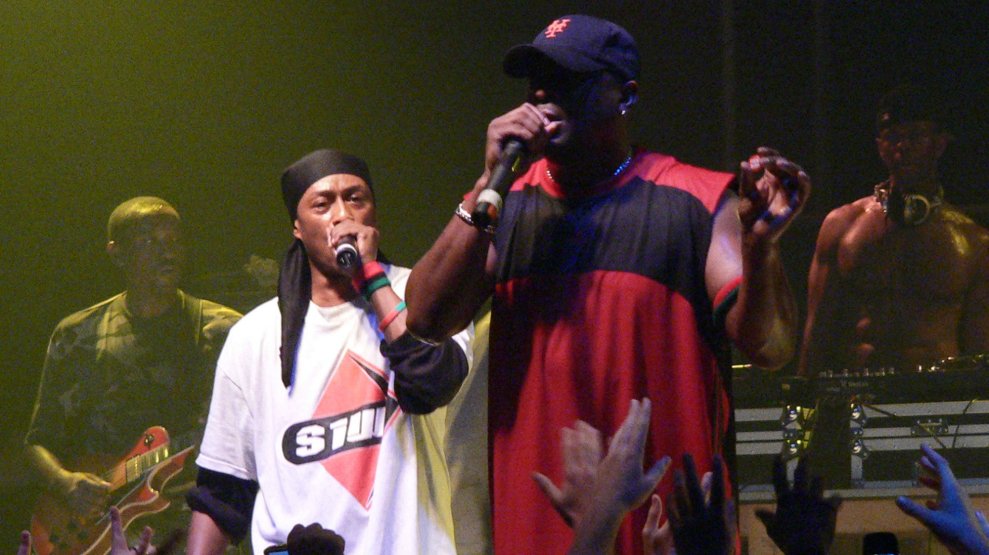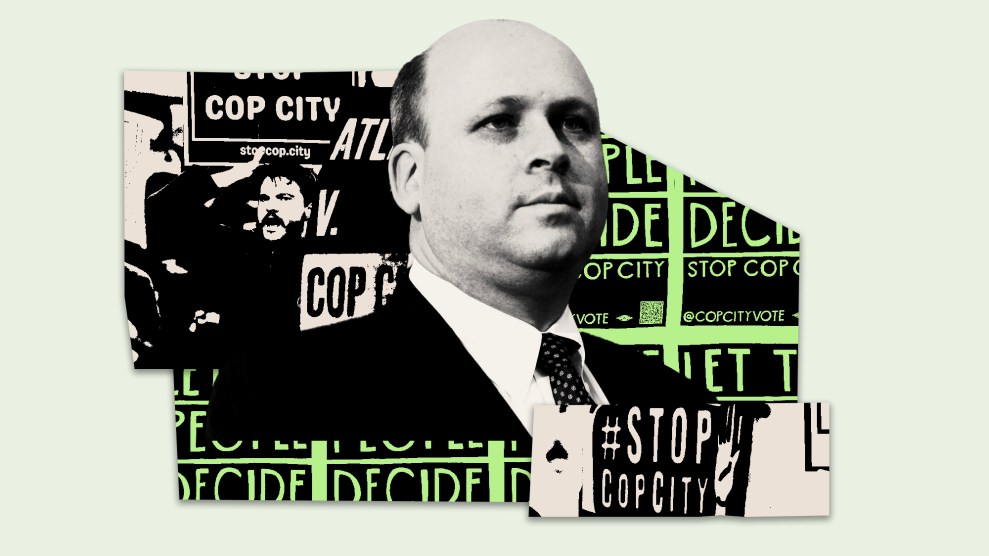
Young Thug, whose real name is Jeffery Williams, at a hearing in Atlanta on Dec. 22, 2022. Arvin Temkar/AP
For nearly a year, the rapper Young Thug has been behind bars in Cobb County, Georgia. The 31-year-old, born Jeffery Lamar Williams, is facing charges that could send him to prison for twenty years. Widely considered one of the most stylistically innovative rappers of his generation, Williams has been charged, along with 27 others, with conspiracy to violate Georgia’s RICO Act. The indictment claims that Young Stoner Life (YSL)—the record label and rap crew that Young Thug founded in 2016 and that is made up largely of friends and family members—is a criminal street gang associated with the Bloods.
The trial began in January. Eight defendants, including Williams’ top musical protege Sergio Kitchens—better known as Gunna—have already taken plea deals. Williams’ longtime attorney Brian Steele has denied all charges and maintained his client’s innocence.
Any trial of Young Thug would make national news. But it has been more notable for other reasons, too. The prosecutor bringing the charges is Fulton County District Attorney Fani Willis (Young Thug is being held in Cobb County jail because of safety concerns), a Black woman elected in 2020 who has become a celebrity of sorts for her dogged pursuit of two distinct targets: Trump and gangs. Her national profile has grown as Willis has led the investigation into Donald Trump’s attempt to overturn the 2020 Presidential election. In Atlanta, she may be more well-known for her aggressive prosecution of street gangs, who Willis has said are “committing conservatively 75 to 80 percent of all of the violent crime.” (Willis has not offered evidence for this statistic).
The strategy employed in her case against YSL has also been particular. Willis has used lyrics from Young Thug songs, and other artists associated with YSL, to support her allegation that YSL is more than a rap crew. “If you decide to admit your crimes over a beat, I’m going to use it,” she said at a press conference in September.
Williams is directly charged with multiple illegal drug and gun charges stemming from a May 9 raid on his home. He has been accused of allegedly renting the car used in a drive-by murder of a man named Donovan Thomas in 2015. (According to Willis, it was this killing that sparked an even greater conflict between YSL and YFN, a rap crew led by the rapper YFN Lucci that is also rolled up in a RICO case that uses Lucci’s lyrics as evidence in the initial indictment.) But the more serious, and more nebulous charge is that he is a leader. RICO laws were historically used to go after difficult-to-prosecute suspects like Mafia bosses or white-collar criminals. People who oversee a criminal enterprise but may not be directly involved with crimes themselves. Williams is called the “organizer, supervisor or other position of management or leadership of the criminal street gang YSL,” per the indictment.
Under RICO laws, that makes him culpable for the actions of others. The glue for these allegations are documents and communication, broadly defined. These are referred to in the indictment as “overt acts in furtherance of the conspiracy.” These include clothing, tattoos, social media posts, photographs, and song lyrics. We got a sample of this on the first day of jury selection in January, when the Atlanta Judicial Circuit Chief Judge Ural Glanville read aloud one of those “overt acts”: the chorus of Williams’ song Slime Shit. “Hey this that slime shit, hey, YSL shit, hey, killin 12 shit, hey, fuck a jail shit, hey,” the court heard Young Thug rap. (The awkward clash of boastful and violent rap lyrics recited in a setting as sterile as a courtroom led to the clip going viral.)
Over the last decade, awareness of the phenomenon known as “Rap on Trial” has grown rapidly. The 2019 book Rap On Trial: Race, Lyrics, and Guilt in America by the University of Richmond English professor Erik Nielson and Attorney and University of Georgia Law Professor Andrea Dennis documented 500 criminal cases dating back to the early-1990s using rap lyrics as evidence. A March 2022 New York Times investigation by Jaeah Lee and Professor Dennis found that the practice has become even more common since 2005. Introducing rap lyrics as evidence, Dennis and Nielson argue, is a way prosecutors can use the trope of Black criminality without making it explicit.
“With the exception of a couple of higher profile artists, this practice typically targets young amateurs who are almost exclusively Black or Latino,” said Nielson. “If you’ve been charged with a shooting, [prosecutors] find some lyrics that you wrote about shooting. If you wrote those lyrics after the fact, that was a confession. If you wrote the lyrics before the crime, it’s an indication of your knowledge about firearms or your intent.”
Nielson said that fame has kept well-known rappers “largely insulated,” from this type of prosecution. But that has since changed. Amid growing objections from politicians, legal advocates, and people in the music industry, prosecutors and detectives are using lyrics against some of the genre’s rising stars. With his trial, Young Thug joins Youngboy NeverBrokeAgain, Drakeo The Ruler, Bobby Shmurdah, Tay-K, and Tekashi SixNine—all have had their lyrics used against them in court over the last decade. Like the YSL case, Drakeo The Ruler and Bobby Shmurdah’s cases were also RICOs alleging that their respective rap crews were gangs. Once underground, Rap on Trial has crossed over into the mainstream.
In these cases, prosecutors latch “onto the fictional reality of rap to use in prosecuting crimes because they often painted a narrative of society [that] jurors would more easily accept and believe: violent, criminal black and latino young men,” Nielson and Dennis write in Rap on Trial. With other forms of art, “we seem fully capable of understanding the possibility for figurative language, for metaphor, for exaggeration,” said Nielson. “But with rap music, at least in courts. That’s not how it’s playing out at all.”
A strategy that opponents of Rap on Trial have taken is to employ expert witnesses who can testify to the artistic merit of oftentimes lewd and shocking lyrics about taboo subjects. Nielson has become the go-to for defense attorneys. He estimated that he’s testified in court a dozen times and been retained on over 100 cases, many of which have not gone to trial. (In our interview, Nielson declined to speak on the specifics of the YSL case, because Williams’ legal team has retained him as an expert witness.)
“My role is to inform judges and juries about the inventions of rap music, the history of rap music, and the commercial demands of rap music in order to provide a counter-narrative to the prosecutors and to explain to jurors that yes, what you’re seeing here may seem unfamiliar, it might even seem offensive or frightening. But this is a very, very popular and influential genre and it’s providing upward mobility for many people, and these people are coming from communities where those opportunities are scarce at best,” said Nielson.
This has been the central tension of the current trial of Young Thug. How do the use of the lyrics in the RICO trial of Williams shed light on what we give to Black artists who come from the neighborhoods that the country often otherwise ignores? As Zak Cheney-Rice wrote for New York, Williams’ music has had the “ability to channel the trap’s malaise, its anguish, its thrill.” His life story has been one circumscribed by a particular violence: poverty, guns, drugs. He made these American sins into art. And yet the music isn’t only about Williams individually. And neither is the trial. In both, Young Thug is both an individual and an example.
“In 2023, why is Black pain and criminality marketed and sold? And then on the other side, why are the conditions that create poverty and violence not addressed?” asked Kenneth J. Montgomery a former prosecutor turned criminal defense attorney based in Brooklyn. Montgomery represented Bobby Shmurdah early on in his case, and has advised other attorneys on how to approach the use of rap lyrics on trial. He also grew up in Brownsville, Brooklyn and was a firsthand witness to the rise of hip hop—which celebrates its 50th birthday this year—from Black youth subculture to billion dollar industry.
“When you look at what’s happened in the 50 years since hip hop started. Those neighborhoods of Brownsville where I came from, nothing has changed,” said Montgomery. “So what are we really celebrating?”
As documented by Jeff Chang in his 2005 book Can’t Stop, Won’t Stop: A History of the Hip Hop Generation, hip hop was born out of “benign neglect” for poor predominantly Black neighborhoods. The genre came to prominence at the same time as the American prison population exploded. For many years this music performed by mostly poor Black men was vilified and struggled to achieve mainstream legitimacy. But as fears of crime in America receded, so did the moral panic about rap music. In 2021 Barack Obama called Jay-Z, whose lyrics once spun tales of navigating a violent life as a drug dealer, “the embodiment of the American dream.”
In the case of Young Thug and YSL, we see the outcome of a genre that incentivizes a particular kind of sensation and controversy running up against a state apparatus more than willing to scapegoat that genre if it means skirting responsibility for the conditions that give rise to headlines about upticks in crime. That should provoke profound discomfort for anyone watching: Here is the art we love used for punishment. No one has to forgive violence to wonder: Are we policing a wider crisis? Rewarding Williams alone didn’t save the community he comes from. Jailing him won’t either. And yet that is all we seem to offer.
Correction, April 6: An earlier version of this story misstated where Young Thug has been in jail.














